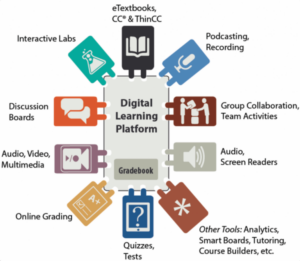Information Technology Services (ITS)
New initiatives coming to the Academic Toolbox
Published on: February 17, 2022
 Annually, the Information Technology Services’ (ITS) Academic & Collaborative Technologies (ACT) department performs a review of the Academic Toolbox to see what services and solutions need refreshing. As a result of this annual cycle, three new initiatives are being explored, with a goal of having them tested and confirmed for the 2022-2023 academic year.
Annually, the Information Technology Services’ (ITS) Academic & Collaborative Technologies (ACT) department performs a review of the Academic Toolbox to see what services and solutions need refreshing. As a result of this annual cycle, three new initiatives are being explored, with a goal of having them tested and confirmed for the 2022-2023 academic year.
The University of Toronto’s (U of T) Academic Toolbox consists of teaching tools that enhance teaching and learning at the University, including access to external course content, additional grading or assignment capabilities and news ways to interact with and between students.
With new tools coming out all the time, instructors are interested in being able to use them within their courses, often as fully integrated tools within Quercus and the Office 365 Collaborative Suite. In order to integrate these new tools and alternate applications at U of T, the tools first need to go through a formal process.
Currently, teams of subject matter experts are assembling the functional requirements for three new solutions to add to the toolbox. Once these requirements are assembled, members of the community will be invited to provide feedback through a public comment forum.
“As exciting as it may be to use a new tool or access new content, we have to remember that Quercus is an indispensable part of U of T’s teaching and learning environment, and it needs to remain secure and stable,” says Avi Hyman, Director, ACT. “A poorly designed external tool could compromise the entire system and lead to security breaches, system slowdowns or even complete service interruptions, so we’ve introduced a rigorous process to make sure this doesn’t happen.”
Initiative #1: Audience response solution
Instructors use audience response solutions in their in-person classrooms as a way to engage students, aid groupwork and gain an understanding of what information they are absorbing.
The subject-matter expert group is currently in the process of gathering options for this solution as the current contact is ending, and then there will be an opportunity for U of T community members to provide input into the final selection.
Initiative #2: Online grading tool
This tool allows instructors and their teaching assistants to grade assignments and exams more efficiently — especially those written by hand.
The contract for our current solution is expiring, so the subject-matter expert group is collecting the functional requirements before opening it up to community input.
Initiative #3: Online proctoring tools
This solution enables instructors to monitor students while they take exams in remote locations.
The contract for our current solution is expiring, so the subject-matter expert group is collecting the functional requirements before opening it up to community input.
Recent addition to the Academic Toolbox
Ahead of the above initiatives, a social annotation tool was recently added to U of T’s toolbox. This tool allows students to share comments and collaborate on a variety of course documents including textbooks, articles and notes.
Organized by Laurie Harrison, Director, Digital Learning Innovation, in partnership with eCampusOntario, a pilot project is running in 2021-2022 to explore the tool’s potential by allowing instructors to test the solution and provide feedback.
“Instructors participating in the pilot see the Hypothesis social annotation tool as a valuable support to development of critical thinking skills,” explains Laurie. “It provides students with the opportunity to engage more closely with the course readings, hone their analysis of the text, and also share insights with peers.”
For updates on these initiatives and opportunities to participate, visit https://act.utoronto.ca/act-projects/.

